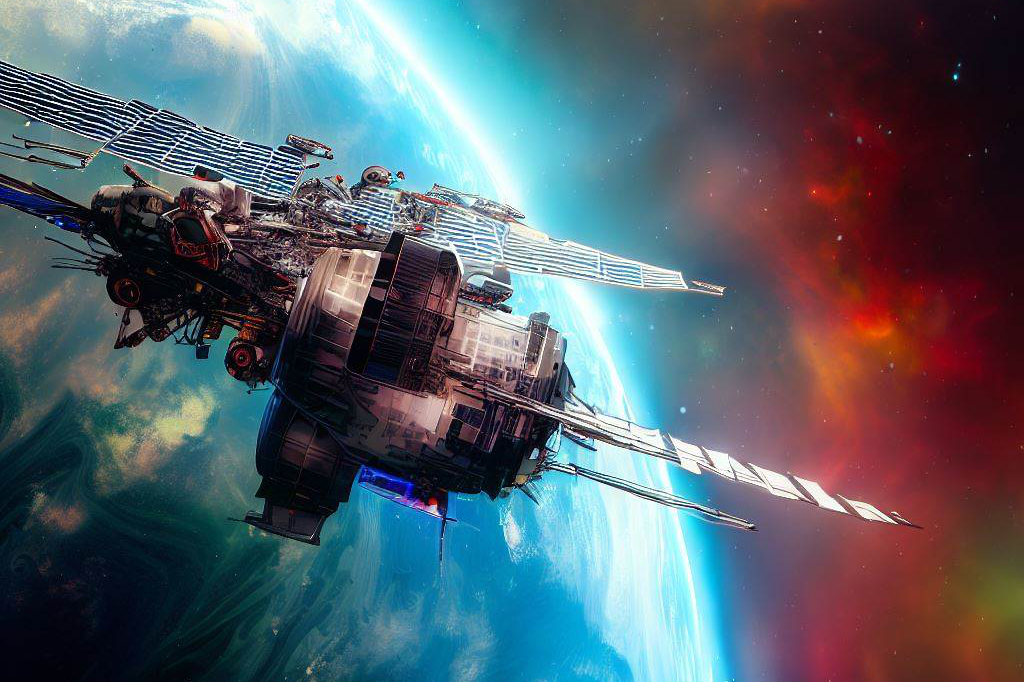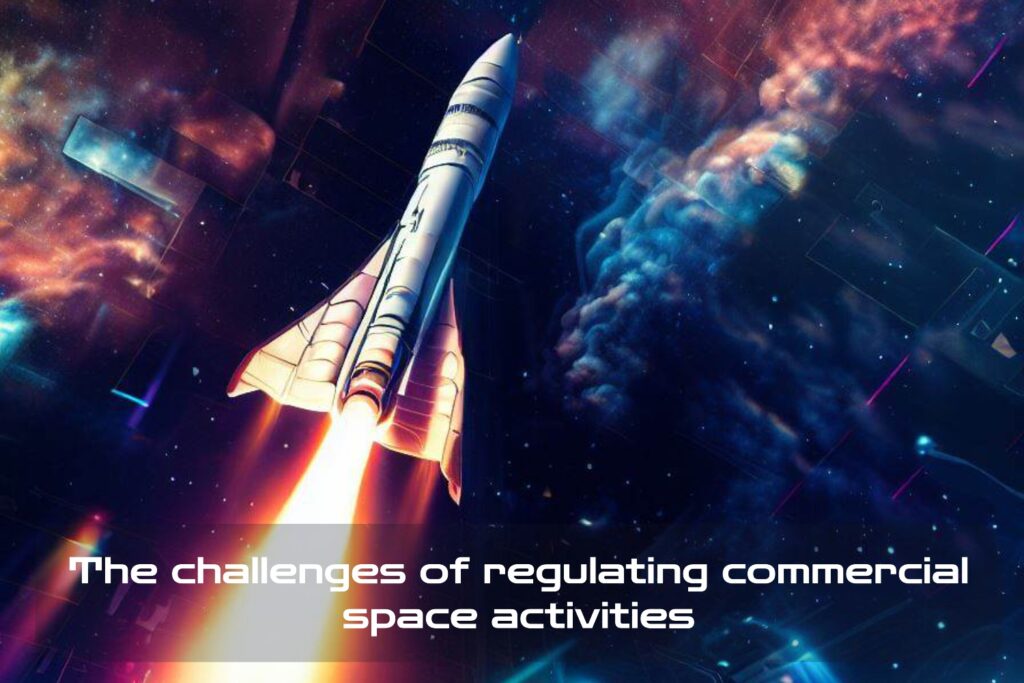The New Frontier: Regulating Commercial Space Activities
Brief Overview of Commercial Space Activities
In recent years, the space industry has undergone a significant transformation. What was once the domain of national governments and a few private companies has now opened up to a variety of new players, including start-ups and venture capitalists. These firms are aiming to capitalize on the growing demand for satellite-based services like remote sensing, global positioning systems (GPS), and telecommunications.

The commercial space industry encompasses a wide range of activities, including
- satellite launches, operations, and maintenance;
- human spaceflight;
- space tourism;
- asteroid mining;
- and other exploration-related activities.
The industry has become increasingly competitive due to low-cost satellite technology, reusable rockets, and advances in 3D printing.
Importance of Regulating These Activities
While there is enormous potential for growth in the commercial space sector, there are also significant risks associated with these activities. Accidents and incidents can have serious consequences both on Earth and in space. For example, collisions between satellites can lead to cascading debris that threatens other spacecraft.
Moreover, international tensions with regards to business interests regarding space ownership continue to rise as more countries develop their own programs. Lack of proper regulation could foster an arms race in space which could potentially lead to war on earth.
Regulations play a crucial role in ensuring safe operation in outer space while preventing harm or damage caused by human actions that could result from activities conducted up there. Regulation also encourages investment by helping build investor confidence that operators will comply with safety standards set by regulatory authorities, as well as instilling public trust that commercial companies will think sustainably while conducting their operations beyond the earth’s boundaries.
The Challenges of Regulating Commercial Space Activities
Lack of International Regulations and Standards

One significant challenge facing the regulation of commercial space activities is the lack of international regulations and standards. While there are international treaties and agreements in place governing space activities, they are often outdated and fail to address new commercial space operations.
This creates a regulatory gap, allowing companies to operate outside the scope of current regulations. Another issue is that these international agreements lack enforcement capabilities.
There is no global regulatory body enforcing compliance with these treaties, leaving countries to enforce their own regulations. This can lead to different countries having different rules and requirements for commercial space operations, creating a patchwork of conflicting regulations.
The need for updated regulations that apply specifically to new commercial space activities is crucial. With the rise of private companies launching rockets and satellites into orbit for profit, it’s essential that governments work together to develop a comprehensive regulatory framework that promotes safety while encouraging innovation.
Limited Government Oversight and Enforcement Capabilities

Another significant challenge in regulating commercial space activities is limited government oversight and enforcement capabilities. Many countries lack the resources or expertise needed to monitor all aspects of these complex operations effectively.
As a result, some companies may cut corners or disregard safety protocols without adequate oversight or punishment. Additionally, some governments may be hesitant to impose strict regulations on their domestic companies for fear of stifling innovation or losing business opportunities.
To address this issue, it’s crucial that governments invest in regulatory bodies with sufficient funding and resources to oversee these operations effectively. It’s also important for regulators from different countries to coordinate efforts and share information about potentially unsafe practices among operators.
Rapidly Evolving Technology and Business Models
The rapid pace at which technology is advancing presents another significant challenge in regulating commercial space activities. New technologies such as reusable rockets, satellite constellations, lunar landers, and space tourism are emerging, which require new regulatory frameworks.
Additionally, the business models used by commercial space companies are changing. Some companies are offering ride-sharing options for satellite launches or developing more affordable launch vehicles to lower the barrier of entry into the industry.
These new models challenge traditional regulatory approaches and require a shift in thinking about how governments regulate space activities. To address this challenge, regulators must be flexible to adapt to these changes.
They will need to work closely with industry stakeholders to develop regulations that promote safety while not stifling innovation. Regulators should also leverage technology by using data analytics and artificial intelligence to monitor compliance and identify potential safety risks.
Lack of international regulations and standards

Space activities have been going on for more than half a century, but only recently have we seen an explosion in commercial space ventures. Unfortunately, the international regulations and standards that govern space activities were primarily designed for government programs and do not address concerns specific to commercial entities. This lack of regulation poses significant challenges to the safety and sustainability of space activities.
Overview of current international treaties and agreements related to space activities
The Outer Space Treaty of 1967 is the primary treaty governing space activities. It sets out basic principles, such as prohibiting countries from claiming celestial bodies or using them for military purposes.
The treaty also requires countries to authorize and supervise their non-governmental entities involved in space activities. Additionally, several UN resolutions have been passed over the years that provide guidelines on issues such as debris mitigation.
However, these treaties were designed for a time when only a few countries had access to space technology. Today, more than 80 countries are involved in some form of space activity, including private companies, which makes it challenging to enforce these treaties effectively.
Challenges in enforcing these treaties
One major challenge in enforcing these treaties is that there is no central authority responsible for regulating or policing commercial space activities. This lack of oversight creates loopholes that allow companies to bypass regulations put in place by individual countries or even ignore them entirely. Another challenge is that different countries interpret the existing regulations differently.
Some countries may have stricter guidelines, while others may be more lax, depending on their own interests and priorities. Such disparities can lead to conflicts between nations with varying interests and agendas.
Need for updated regulations to address new commercial space activities
With the rapid growth of commercial space ventures, there has been a pressing need for new regulations that specifically address the unique challenges faced by private entities operating in outer space. Updated regulations can provide a more comprehensive framework for the safety, security, and sustainability of space activities. These regulations should address issues such as the use of space resources, liability in case of accidents, and debris mitigation.
New guidelines could also help to harmonize different countries’ interpretations of existing regulations. Ultimately, new regulations can help ensure that commercial space activities contribute positively to society while minimizing risks and negative externalities.
The Challenges of Limited Government Oversight and Enforcement of Commercial Space Activities

While there are some regulations in place to govern commercial space activities, they are not always robust and are often difficult to enforce. The main reason for this is that government oversight and enforcement capabilities are mostly limited, with regulatory agencies being understaffed and under-resourced. This has resulted in challenges in monitoring and enforcing regulations.
Overview of Current Regulatory Bodies Responsible for Overseeing Commercial Space Activities
The Federal Aviation Administration (FAA) Office of Commercial Space Transportation (AST) is the primary regulatory body responsible for overseeing commercial space activities in the United States. The FAA AST issues licenses, permits, and approvals for launch operations, reentry operations, and the operation of launch sites. However, the FAA AST’s ability to monitor operations is limited due to funding constraints.
They lack sufficient resources to track all launches or monitor all spacecraft once they are in orbit. The lack of resources means that some companies may not be subjected to adequate regulation.
Challenges in Monitoring and Enforcing Regulations Due to Limited Resources
The limited resources available to regulatory agencies make it challenging for them to monitor every aspect of commercial space activities effectively. For example, although companies must submit a plan detailing measures they will take if something goes wrong during a launch or while a spacecraft is in orbit, it can be challenging for regulators to ensure these plans are adequate and followed through on when necessary.
Funding also plays a role in the challenges faced by regulatory bodies regarding enforcement capabilities. There have been cases where larger companies have been able to challenge fines imposed on them by regulatory agencies because their legal teams were able to drag out proceedings long enough that the fines became insignificant compared with the cost of compliance.
The Need for Increased Funding and Resources for Regulatory Agencies
Given the challenges faced by regulatory agencies, it’s clear that increased funding and resources are needed to ensure effective oversight and enforcement of commercial space activities. The funds could be used to hire more staff, provide in-depth training, obtain new technology for monitoring and surveillance, or even helped fund private industry initiatives that support these efforts. The investment would not only enable regulators to keep up with new trends in the commercial space industry but also provide more assurance to those participating in these activities that they are working within a safe and well-monitored environment.
The Rapidly Evolving Space Industry

The space industry is advancing at a rapid pace, with new technologies and business models being developed almost every day. From reusable rockets to satellite constellations and asteroid mining, the possibilities are endless.
However, these advancements also present unique challenges for regulators who struggle to keep up with the pace of technological change. One of the biggest challenges facing regulators is the lack of expertise in this highly technical field.
As technology advances, so does the need for specialized knowledge and skills. Regulators must work closely with industry experts to stay informed about new developments and ensure that regulations are up-to-date.
Keeping Up with Technological Advancements

Keeping up with technological advancements in the space industry can be a daunting task for regulators. New technologies such as 3D printing, robotics, machine learning, and artificial intelligence offer exciting possibilities for space exploration and commercialization.
However, these technologies also bring new risks that must be addressed by regulations. One key challenge is ensuring safety in an industry where risks can have catastrophic consequences.
Regulators must work closely with private companies to ensure that their technology meets safety requirements before being launched into space. This requires a deep understanding of how these technologies work along with rigorous testing procedures.
A Need for Flexible Regulations
The rapidly evolving nature of the space industry means that regulations must be flexible enough to adapt to changing business models. Traditional regulatory frameworks may not always be suitable for emerging commercial activities such as asteroid mining or satellite servicing missions. Regulators must strike a balance between promoting innovation while also ensuring safety and sustainability in this unique environment.
This requires collaboration between government agencies, private companies, and other stakeholders to develop standards and best practices that can guide the development of this nascent industry. Regulating commercial activities in space presents many challenges due to rapidly evolving technology and business models.
To overcome these challenges, regulators must stay informed about new developments and work closely with industry experts to ensure that regulations are flexible and adaptable. Failure to do so could result in safety risks, environmental damage, or other negative consequences for the space industry and humanity as a whole.
Final Thoughts

Regulating commercial space activities is a complex and challenging task. The lack of international regulations and standards, limited government oversight and enforcement capabilities, and rapidly evolving technology and business models are just some of the challenges that regulators face in this area. Despite these challenges, it is essential to regulate commercial space activities to ensure their safety, sustainability, and compliance with ethical standards.
Without proper regulation, there is a risk that these activities could cause harm to people or the environment. Looking forward, it will be essential to work towards developing new regulations that can address the unique challenges posed by commercial space activities.
This may involve working with international bodies to create new agreements or updating existing ones to reflect changes in technology and business models. It may also require increased funding for regulatory agencies to enable them to monitor and enforce regulations effectively.
While regulating commercial space activities presents significant challenges, it is a necessary task that must be tackled if we are going to continue exploring space sustainably. By working together as an international community and committing appropriate resources towards regulatory efforts, we can help ensure that commercial space activities serve humanity’s best interests now and in the future.
FAQ: Navigating the Challenges of Regulating Commercial Space Activities
1. What are commercial space activities?
– Commercial space activities refer to the operations and ventures conducted by private companies in space, including satellite launches, space tourism, exploration, and resource extraction.
2. Why is it important to regulate commercial space activities?
– Regulating commercial space activities is crucial for several reasons. Firstly, it ensures the safety and security of space operations, preventing accidents and minimizing the risk of collisions or conflicts. Secondly, regulation promotes responsible and sustainable space exploration, minimizing the negative impact on celestial bodies and preserving space resources. Lastly, it fosters fair competition, encourages innovation, and provides legal frameworks for resolving disputes in this emerging industry.
3. What are the challenges associated with regulating commercial space activities?
– There are several challenges in regulating commercial space activities. Firstly, there is a lack of international regulations and standards that specifically address the unique aspects of commercial space operations. This makes it difficult to establish consistent guidelines and procedures across different nations and companies. Secondly, the rapidly evolving technology and business models in the space industry make it challenging to keep regulations up to date. Additionally, limited government oversight and enforcement capabilities pose obstacles in monitoring and enforcing compliance with regulations.
4. Are there any existing international treaties and agreements related to space activities?
– Yes, there are several international treaties and agreements that address space activities. The Outer Space Treaty of 1967 is a fundamental framework that establishes principles for space exploration and utilization. Other important treaties include the Rescue Agreement, Liability Convention, and Registration Convention. These agreements aim to promote peaceful and responsible use of space, facilitate international cooperation, and provide guidelines for the liability and registration of space objects.
5. What are the challenges in enforcing these treaties?
– Enforcing space treaties faces challenges due to the lack of an international regulatory body with strong enforcement powers. The responsibility of ensuring compliance typically falls on individual nations. However, the extraterritorial nature of space activities and limited resources of regulatory agencies make it difficult to monitor and enforce compliance effectively. Additionally, the rapid growth of commercial space activities has highlighted the need for updated regulations that address emerging technologies and business models.
TL;DR…
– ✈️ Commercial space activities refer to operations conducted by private companies in space, including satellite launches, space tourism, exploration, and resource extraction.
– 🌍 Regulating commercial space activities is important to ensure safety, security, and prevent accidents or conflicts.
– ♻️ Regulation promotes responsible and sustainable space exploration, minimizing negative impacts on celestial bodies and preserving space resources.
– 💪 Regulating commercial space activities fosters fair competition, encourages innovation, and provides legal frameworks for dispute resolution.
– 🌐 Challenges in regulating commercial space activities include a lack of international regulations and standards specific to the industry.
– 🚫 Limited government oversight and enforcement capabilities pose obstacles in monitoring and enforcing compliance.
– 📈 The rapidly evolving technology and business models in the space industry make it challenging to keep regulations up to date.
– 🌍 Current international treaties and agreements address space activities, such as the Outer Space Treaty of 1967.
– 🌟 Enforcing these treaties faces challenges due to the lack of a strong international regulatory body.
– 💼 Responsibility for ensuring compliance falls on individual nations, but monitoring is difficult due to limited resources.
– 💡 Updated regulations are needed to address new commercial space activities and emerging technologies.
– 🏢 Current regulatory bodies oversee commercial space activities, but face challenges in monitoring and enforcing regulations.
– 💰 Increased funding and resources are necessary for regulatory agencies to effectively fulfil their oversight responsibilities.
– 🚀 The space industry is rapidly evolving, and regulations need to keep up with technological advancements.
– 📜 Flexible regulations are necessary to accommodate the dynamic nature of the space industry and encourage innovation.

C M, a seasoned editor, journalist, and consultant, is deeply fascinated by the convergence of technology, space, and the future of humanity.
With a particular interest in transhumanity, futurology, and the philosophical and ethical dimensions of these domains, C M serves as the lead contributor to SpaceSpotlight and TranscendSphere.
When not penning insightful articles on these rapidly evolving fields, C M indulges in their love for podcasts and books, proudly embracing their status as a ‘Happy Nerd Extraordinaire!’



